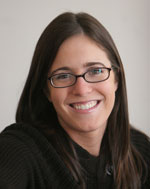Twenty Something / Christina Capecchi
Praying mothers support their gold-medal athletes
 The one thing that may be harder than being an Olympian is being the parent of an Olympian. As I watched the London games, I was awed by the athletes and charmed by their parents.
The one thing that may be harder than being an Olympian is being the parent of an Olympian. As I watched the London games, I was awed by the athletes and charmed by their parents.
There was Michael Phelps’ mom, Debbie Phelps, her eyes and mouth drawn into o’s, momentarily misreading a silver-medal finish for a gold then breaking into polite applause as reality sunk in.
There were Aly Raisman’s parents, moving as much as possible while seated—leaning back, rocking forward, biting their lips as their 18-year-old daughter flipped across a 4-inch-wide beam.
“I think they were more nervous than I was,” Aly told NBC sportscaster Bob Costas.
But the parent who impressed me most was Rita Wieber, the Michigan mom who clutched a rosary as her daughter, Jordyn, sailed across the uneven bars.
But her quest for gold involved heartbreak. Jordyn was favored to win the Olympic
All-Around as the highest-scoring gymnast in all four events, and instead she didn’t qualify for the finals. She couldn’t suppress her tears and the image was broadcast endlessly—chin dropped into palms, fingertips pressed to eyes. A symbol of defeat, a longtime dream snatched away.
More striking than the crying was the composure that so quickly followed. Jordyn, who is 17, tweeted: “Thank you all for your love and support. I’m extremely honored to be an Olympian and be a part of this team.”
Rita reflected that night on her blog. “Things don’t always end up as we think they should, but in the end … it becomes obvious that God has a good plan,” she wrote.
Two days later, Jordyn faced another shot at gold, this time as a team. Rita woke in London with a pit in her stomach. “I knew the day could end up great, but if it didn’t,” she wrote in her blog, “I wasn’t sure I could stand to see Jordyn sad anymore.”
Rita went for a morning run and then to a Catholic church to pray the rosary. Sliding into the pew brought a familiar sensation—how many times she had done so back at St. Jude Church in Dewitt, Mich., and now, across the Atlantic, the Church universal, that sense of home.
“My parents always made going to church as a family important,” Jordyn had told Catholic reporter Eileen Gianiaodis. “It’s a very special family time and it means a lot to me.”
Seated in that pew, rosary in hand, altar before her, Rita was overcome by tears. She cried for two hours. Having darted around London with friends and relatives—sightseeing, watching beach volleyball—this was a dose of solitude, allowing the tangle of terror and thrill in her chest to unravel.
Soon it was time for the big meet, and as the U.S. women’s team increased their lead, from vault to bars to beam, Rita let herself watch Jordyn. “She looked so happy, it just warmed my heart.”
The American gymnasts clinched the gold in the team competition, the first such win since 1996. Rita, who is a nurse, took to her blog again, writing, “If I wrote an hour-by-hour timeline of my emotional status over the past 48 hours, it would look like an EKG strip.”
Two days later, Jordyn was sitting in the stands, having declared herself “the loudest cheerleader,” watching her teammate Gabby Douglas win the all-around individual title that she had hoped to clinch. Jordyn cheered wildly and tapped out the congratulatory tweet: “You deserve it, girl!”
The gold medal Jordyn won brought glory, and the gold medal she lost brought character. Back home in Dewitt, she can proudly recite 2 Timothy 4:7: “I have competed well; I have finished the race; I have kept the faith.”
(Christina Capecchi is a freelance writer from Inver Grove Heights, Minn. She can be reached at www.ReadChristina.com.) †
 The one thing that may be harder than being an Olympian is being the parent of an Olympian. As I watched the London games, I was awed by the athletes and charmed by their parents.
The one thing that may be harder than being an Olympian is being the parent of an Olympian. As I watched the London games, I was awed by the athletes and charmed by their parents.